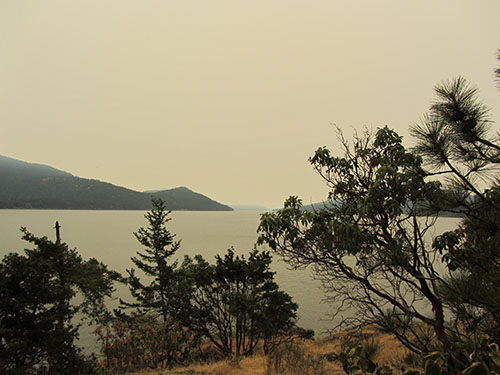||| FROM MICHAEL RIORDAN |||
In Wednesday’s hour-long annual meeting of the Eastsound Water Users Association, there was only limited information given about its financial condition, plus a summary of the recent elections of two new members of the board of directors and a lengthy presentation by General Manager Dan Burke covering the last five years of its water production and usage.
Outgoing President Clyde Duke began by telling the 40 or so Zoom attendees that Carol Ann Anderson and Teri Nigretto had just been elected — by what were landslide margins of over 300 each, as tallied by diligent vote-counter Tom Eversole — to three-year terms on the board, replacing retiring Rick Christmas and Scott Lancaster. It was a truly impressive electoral turnout whose results will help correct the gender imbalance on the EWUA board that Robert Austin, Fred Klein and I identified in our recent Orcasonian article. Duke also mentioned that Joe Cohen and he were leaving the board, which will require the appointment of two new members by the new board when it meets in December.
But Burke’s presentation left many serious questions unanswered, and there was no opportunity at the end for members present to pose them. The watchful listener could tell from one of his charts that the projected operating income was up to about $2.1 million in 2023 from about $1.7 million in 2022, despite relatively flat water-production levels. And total operating expenses were rising rather sharply to around $1.6 million. But what was happening with the other half a megabuck? Did it go into the recent purchases of land, housing and equipment? Or toward beefing up the depleted reserves? Not a word was uttered about that.
And what about all the legal and accounting expenses to address charges of malfeasance by two departed board members? At a September meeting with Austin, Klein and me, Burke allowed that these expenses had exceeded $100,000 — or more than 6 percent of operating expenses. Were these being covered by the added EWUA income from servicing the Doe Bay, Olga, and Rosario water systems? Lacking any details, one could only guess.
Perhaps the next EWUA board meeting in December, at which the 2024 budget will be discussed and approved, will offer some answers. And it should provide two more opportunities to continue correcting the board’s gender imbalance.








Tom Eversole, appointed by the Board to supervise EWUA staff in the counting of the votes and certify the results of the election, gave a reassuring and convincing presentation of the process…something which was unduly complex due to a seriously flawed ballot. Members owe him a debt of gratitude for the over 30 hours it took to determine the results.
Unfortunately, the Annual Meeting did not include the Treasurer’s Annual Financial Report To The Membership as called for in the Bylaws of the Association, nor was there any evidence presented that financial statements of the Association have been facilitated by the Treasurer and reviewed by an independent accountant, something which is also required by the Bylaws.